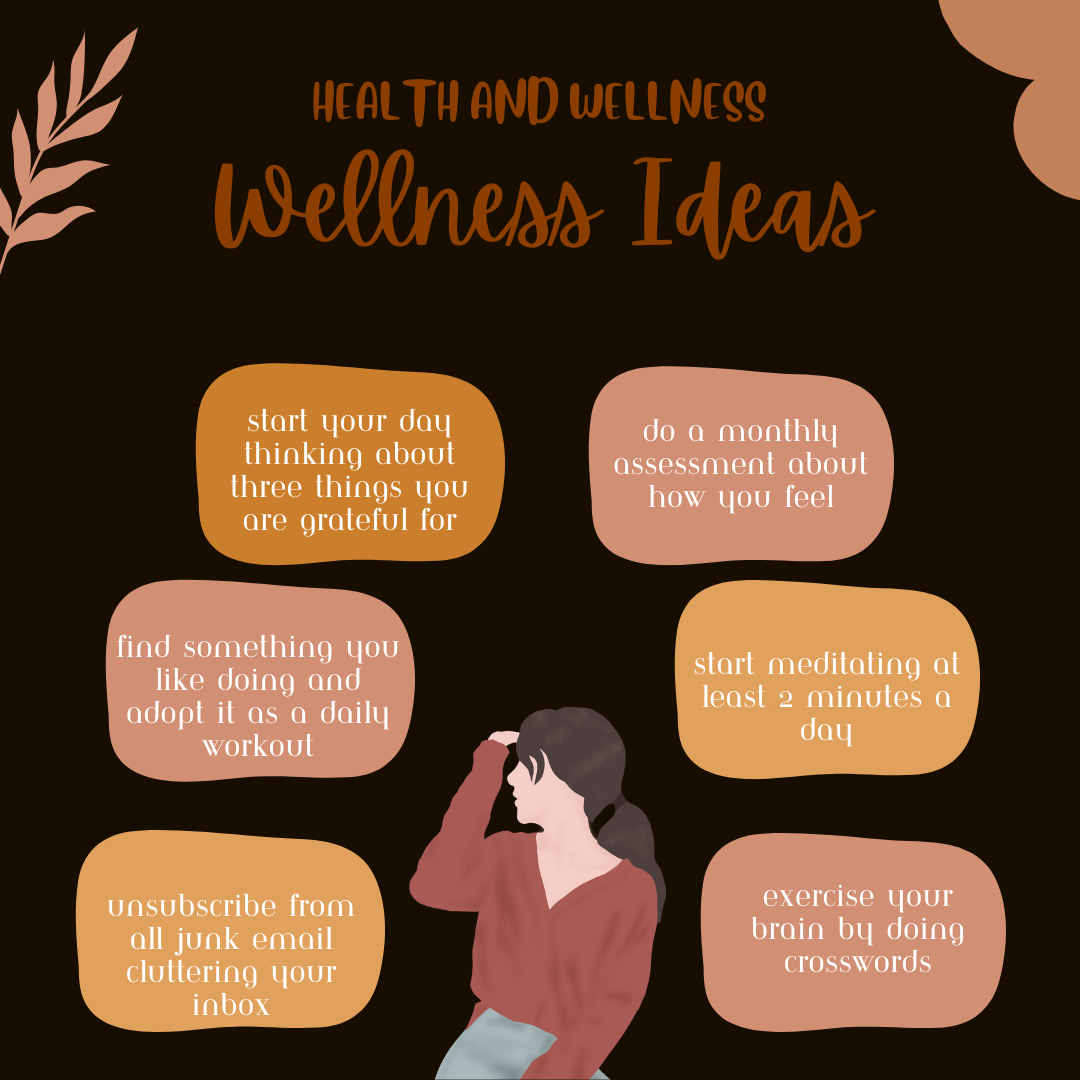Promoting a balanced lifestyle and well-being involves taking care of your physical, mental, and emotional health. Here is some information on food, fitness, stress management, and self-love to help you achieve a healthy and balanced life:
- Food:
- Eat a balanced diet: Include a variety of fruits, vegetables, whole grains, lean proteins, and healthy fats in your meals.
- Portion control: Be mindful of your portion sizes to avoid overeating.
- Stay hydrated: Drink an adequate amount of water throughout the day to keep your body hydrated.
- Limit processed foods: Minimize your intake of processed foods that are high in added sugars, unhealthy fats, and preservatives.
- Practice mindful eating: Pay attention to your body’s hunger and fullness cues, eat slowly, and savor your meals.
- Fitness:
- Engage in regular exercise: Aim for at least 150 minutes of moderate-intensity aerobic activity or 75 minutes of vigorous-intensity aerobic activity each week, along with strength training exercises.
- Find activities you enjoy: Choose physical activities that you find fun and enjoyable, such as walking, dancing, swimming, or playing a sport.
- Stay active throughout the day: Incorporate movement into your daily routine by taking the stairs, walking or biking to work, or doing household chores.
- Listen to your body: Pay attention to how your body feels during exercise and adjust the intensity or type of activity accordingly to avoid injuries.
- Stress Management:
- Practice relaxation techniques: Deep breathing exercises, meditation, and yoga can help reduce stress and promote relaxation.
- Prioritize self-care: Make time for activities that you enjoy and that help you relax, such as reading, taking a bath, listening to music, or spending time in nature.
- Get enough sleep: Prioritize a regular sleep schedule and aim for 7-9 hours of quality sleep each night.
- Set boundaries: Learn to say no when you feel overwhelmed and prioritize your own well-being.
- Seek support: Talk to friends, family, or a professional if you are feeling stressed or overwhelmed.
- Self-Love:
- Practice self-acceptance: Embrace your strengths and weaknesses and remember that nobody is perfect.
- Be kind to yourself: Treat yourself with compassion and avoid negative self-talk.
- Take care of your mental health: Seek support from a therapist or counselor if you are struggling with self-esteem or mental health issues.
- Engage in activities you enjoy: Find hobbies and activities that bring you joy and make time for them regularly.
- Surround yourself with positive influences: Surround yourself with supportive and uplifting people who encourage your well-being.
Remember, it’s important to listen to your body, honor your individual needs, and make sustainable changes that promote long-term well-being in Your World Life. Consulting with healthcare professionals, nutritionists, or fitness trainers can provide personalized guidance and support on your journey to a balanced and healthy lifestyle.
Here is some valuable information on health and wellness that you may find helpful:
- Importance of Regular Exercise:
- Regular exercise has numerous physical and mental health benefits, including improved cardiovascular health, increased muscle strength, weight management, and reduced risk of chronic diseases.
- Engaging in physical activity releases endorphins, which can boost mood and reduce symptoms of stress and anxiety.
- Aim for a combination of cardiovascular exercises (such as brisk walking, running, or cycling) and strength training exercises (such as lifting weights or bodyweight exercises) for optimal fitness.
- Benefits of a Balanced Diet:
- Consuming a balanced diet rich in fruits, vegetables, whole grains, lean proteins, and healthy fats provides essential nutrients and supports overall health.
- A balanced diet helps maintain a healthy weight, reduces the risk of chronic diseases (such as heart disease, diabetes, and certain cancers), and improves energy levels and mental clarity.
- Practice portion control and mindful eating to maintain a healthy relationship with food and avoid overeating.
- Importance of Sleep:
- Quality sleep is vital for overall well-being. It helps regulate hormones, supports immune function, enhances cognitive function, and promotes emotional well-being.
- Aim for 7-9 hours of uninterrupted sleep each night. Establish a regular sleep schedule and create a relaxing bedtime routine to improve sleep quality.
- Stress Management Techniques:
- Chronic stress can have negative effects on physical and mental health. It is important to develop effective stress management techniques.
- Strategies such as deep breathing exercises, meditation, yoga, journaling, and engaging in hobbies can help reduce stress levels and promote relaxation.
- Prioritize self-care activities and set aside time for activities that bring joy and relaxation.
- Mental Health and Self-Care:
- Mental health is equally important as physical health. Take steps to prioritize your mental well-being.
- Practice self-care activities that nurture your mind, body, and soul, such as taking breaks, spending time in nature, practicing mindfulness, and seeking support from loved ones or mental health professionals when needed.
- Normalize discussions around mental health and work towards reducing stigma associated with seeking help.
Remember, everyone is unique, and it’s important to listen to your body and customize your approach to health and wellness based on your individual needs and preferences. It’s always a good idea to consult with healthcare professionals for personalized advice and guidance.
